Comparative Analysis: Business Values of Samsung & Panasonic
VerifiedAdded on 2023/06/06
|10
|2676
|178
Report
AI Summary
This report provides a comparative analysis of the business values of Samsung and Panasonic, two leading multinational electronics organizations. It examines their social and company values, focusing on corporate social responsibility (CSR) initiatives and their alignment with sustainable development goals. The report highlights the similarities and differences in their approaches to environmental welfare, social welfare, and corporate governance. It also assesses the impact of Zadek’s Criteria of social accounting on their sustainable social development initiatives and evaluates how their social reports reflect their stated values. The analysis concludes by reflecting on the impact of this business value assignment on the team members involved, emphasizing the importance of sustainable practices and social responsibility in modern corporations. Desklib provides solved assignments and past papers for students.
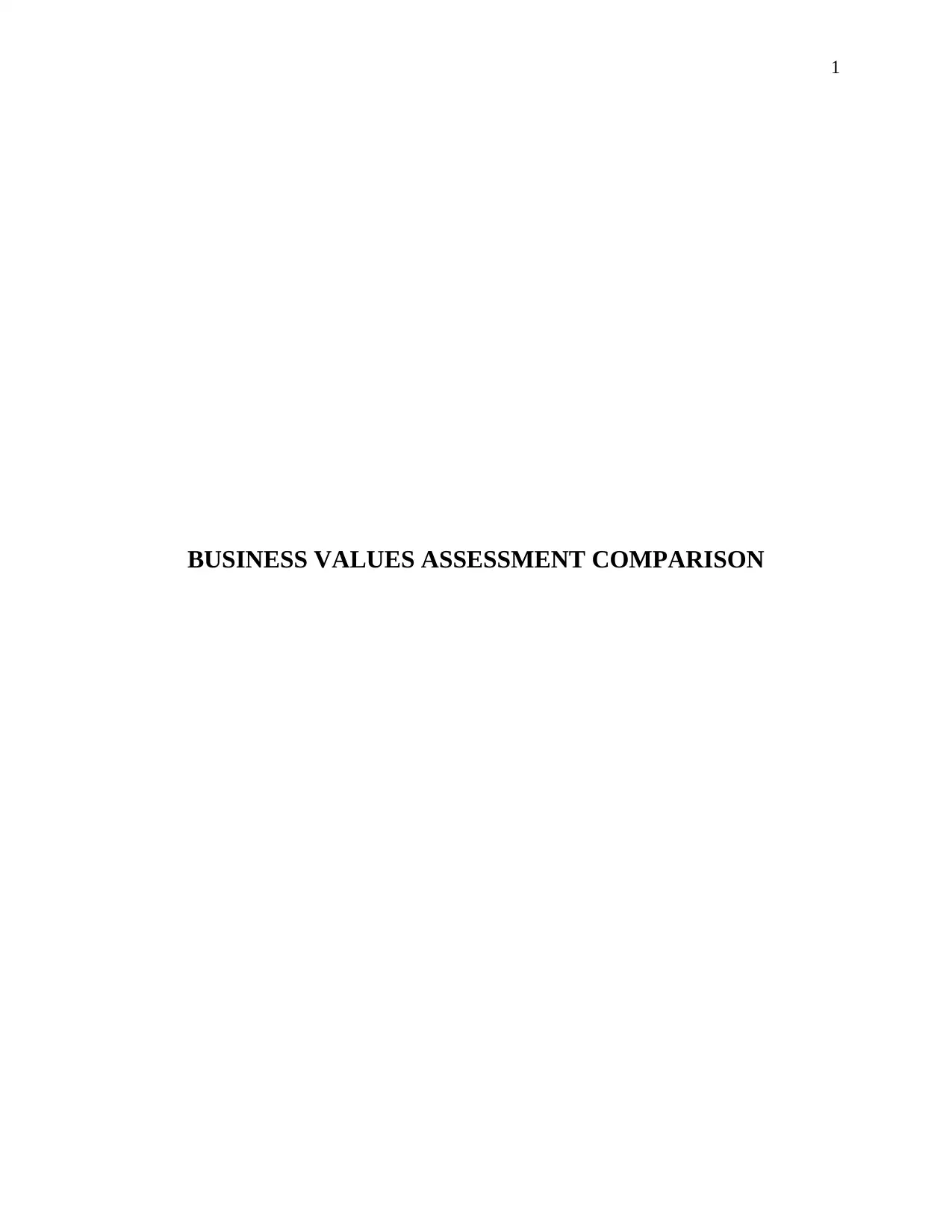
1
BUSINESS VALUES ASSESSMENT COMPARISON
BUSINESS VALUES ASSESSMENT COMPARISON
Paraphrase This Document
Need a fresh take? Get an instant paraphrase of this document with our AI Paraphraser
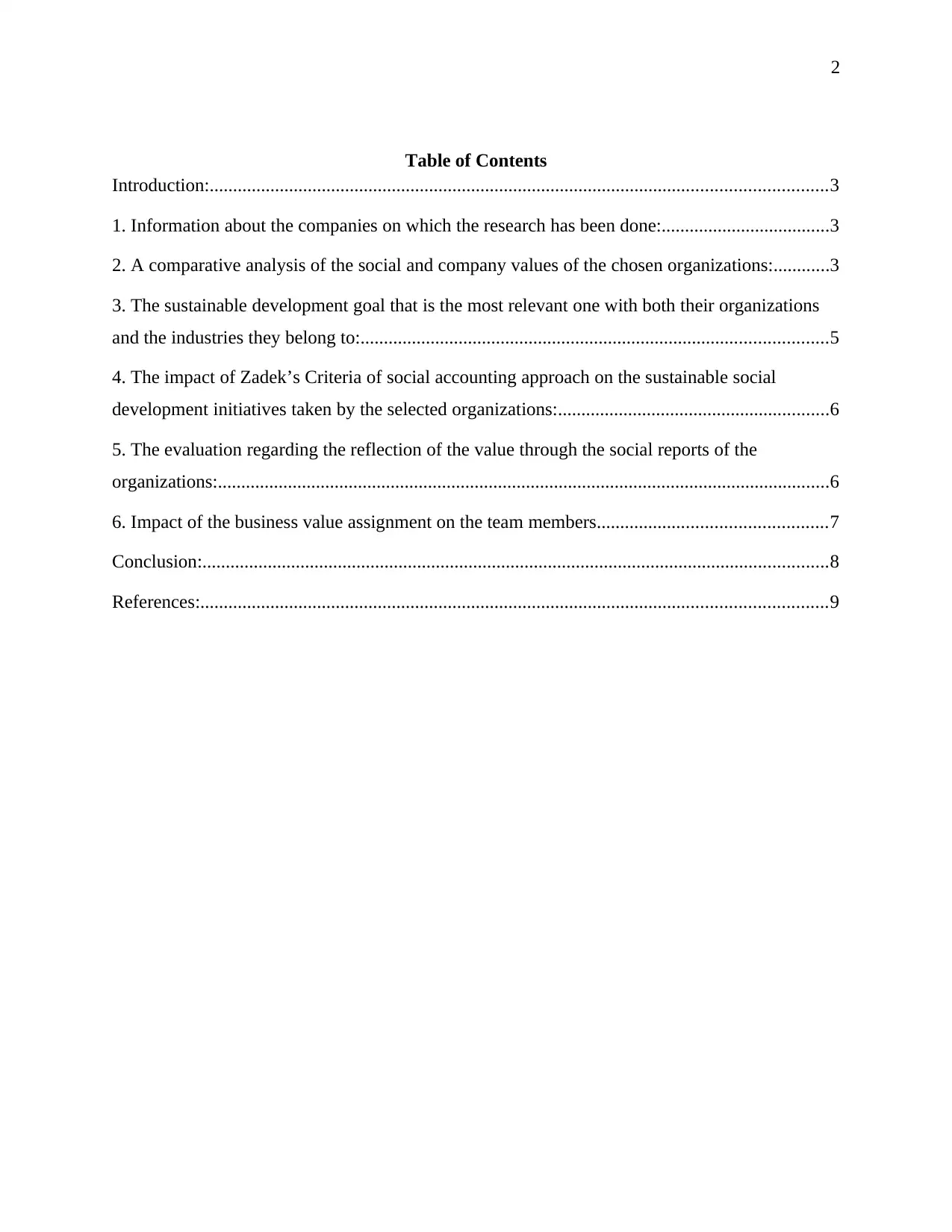
2
Table of Contents
Introduction:....................................................................................................................................3
1. Information about the companies on which the research has been done:....................................3
2. A comparative analysis of the social and company values of the chosen organizations:............3
3. The sustainable development goal that is the most relevant one with both their organizations
and the industries they belong to:....................................................................................................5
4. The impact of Zadek’s Criteria of social accounting approach on the sustainable social
development initiatives taken by the selected organizations:..........................................................6
5. The evaluation regarding the reflection of the value through the social reports of the
organizations:...................................................................................................................................6
6. Impact of the business value assignment on the team members.................................................7
Conclusion:......................................................................................................................................8
References:......................................................................................................................................9
Table of Contents
Introduction:....................................................................................................................................3
1. Information about the companies on which the research has been done:....................................3
2. A comparative analysis of the social and company values of the chosen organizations:............3
3. The sustainable development goal that is the most relevant one with both their organizations
and the industries they belong to:....................................................................................................5
4. The impact of Zadek’s Criteria of social accounting approach on the sustainable social
development initiatives taken by the selected organizations:..........................................................6
5. The evaluation regarding the reflection of the value through the social reports of the
organizations:...................................................................................................................................6
6. Impact of the business value assignment on the team members.................................................7
Conclusion:......................................................................................................................................8
References:......................................................................................................................................9
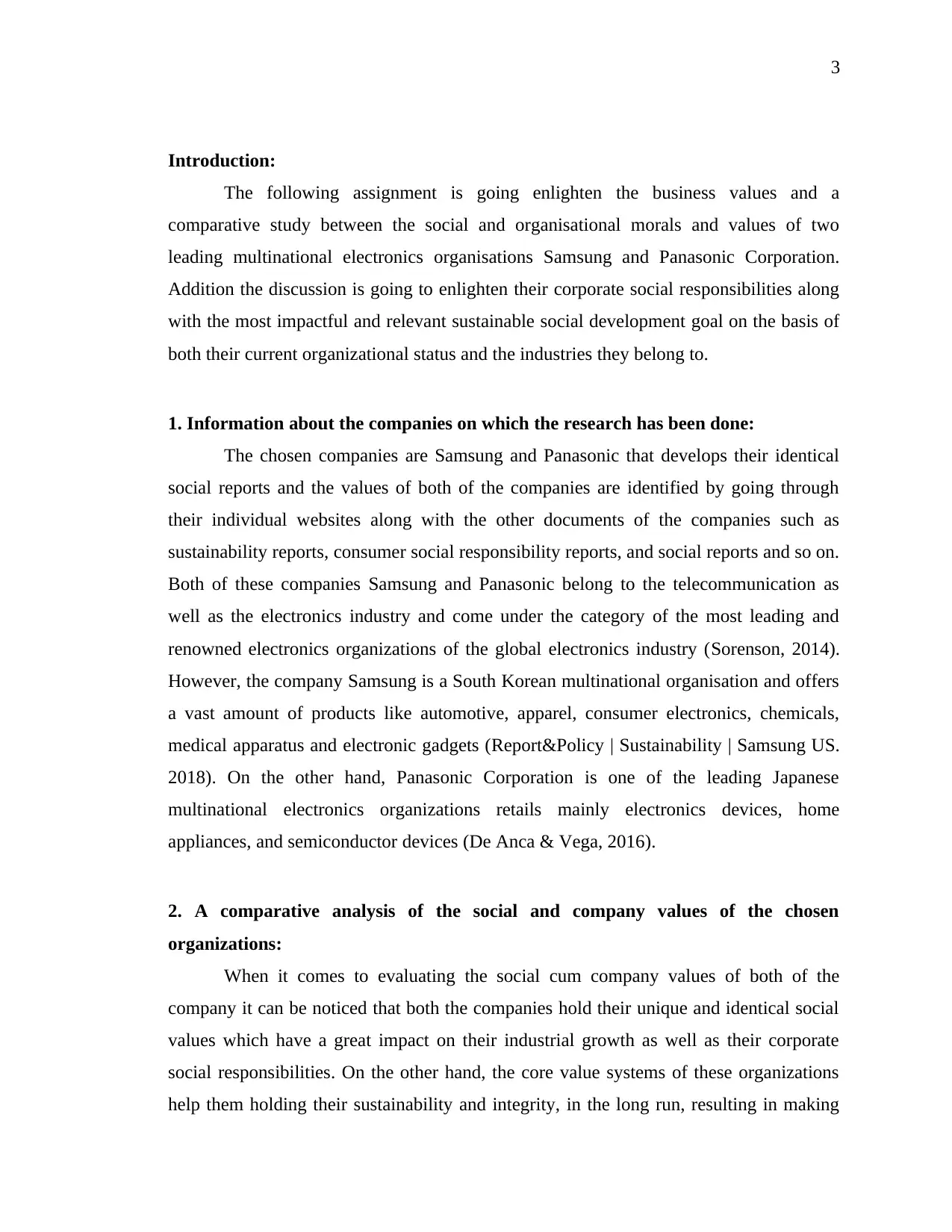
3
Introduction:
The following assignment is going enlighten the business values and a
comparative study between the social and organisational morals and values of two
leading multinational electronics organisations Samsung and Panasonic Corporation.
Addition the discussion is going to enlighten their corporate social responsibilities along
with the most impactful and relevant sustainable social development goal on the basis of
both their current organizational status and the industries they belong to.
1. Information about the companies on which the research has been done:
The chosen companies are Samsung and Panasonic that develops their identical
social reports and the values of both of the companies are identified by going through
their individual websites along with the other documents of the companies such as
sustainability reports, consumer social responsibility reports, and social reports and so on.
Both of these companies Samsung and Panasonic belong to the telecommunication as
well as the electronics industry and come under the category of the most leading and
renowned electronics organizations of the global electronics industry (Sorenson, 2014).
However, the company Samsung is a South Korean multinational organisation and offers
a vast amount of products like automotive, apparel, consumer electronics, chemicals,
medical apparatus and electronic gadgets (Report&Policy | Sustainability | Samsung US.
2018). On the other hand, Panasonic Corporation is one of the leading Japanese
multinational electronics organizations retails mainly electronics devices, home
appliances, and semiconductor devices (De Anca & Vega, 2016).
2. A comparative analysis of the social and company values of the chosen
organizations:
When it comes to evaluating the social cum company values of both of the
company it can be noticed that both the companies hold their unique and identical social
values which have a great impact on their industrial growth as well as their corporate
social responsibilities. On the other hand, the core value systems of these organizations
help them holding their sustainability and integrity, in the long run, resulting in making
Introduction:
The following assignment is going enlighten the business values and a
comparative study between the social and organisational morals and values of two
leading multinational electronics organisations Samsung and Panasonic Corporation.
Addition the discussion is going to enlighten their corporate social responsibilities along
with the most impactful and relevant sustainable social development goal on the basis of
both their current organizational status and the industries they belong to.
1. Information about the companies on which the research has been done:
The chosen companies are Samsung and Panasonic that develops their identical
social reports and the values of both of the companies are identified by going through
their individual websites along with the other documents of the companies such as
sustainability reports, consumer social responsibility reports, and social reports and so on.
Both of these companies Samsung and Panasonic belong to the telecommunication as
well as the electronics industry and come under the category of the most leading and
renowned electronics organizations of the global electronics industry (Sorenson, 2014).
However, the company Samsung is a South Korean multinational organisation and offers
a vast amount of products like automotive, apparel, consumer electronics, chemicals,
medical apparatus and electronic gadgets (Report&Policy | Sustainability | Samsung US.
2018). On the other hand, Panasonic Corporation is one of the leading Japanese
multinational electronics organizations retails mainly electronics devices, home
appliances, and semiconductor devices (De Anca & Vega, 2016).
2. A comparative analysis of the social and company values of the chosen
organizations:
When it comes to evaluating the social cum company values of both of the
company it can be noticed that both the companies hold their unique and identical social
values which have a great impact on their industrial growth as well as their corporate
social responsibilities. On the other hand, the core value systems of these organizations
help them holding their sustainability and integrity, in the long run, resulting in making
⊘ This is a preview!⊘
Do you want full access?
Subscribe today to unlock all pages.

Trusted by 1+ million students worldwide
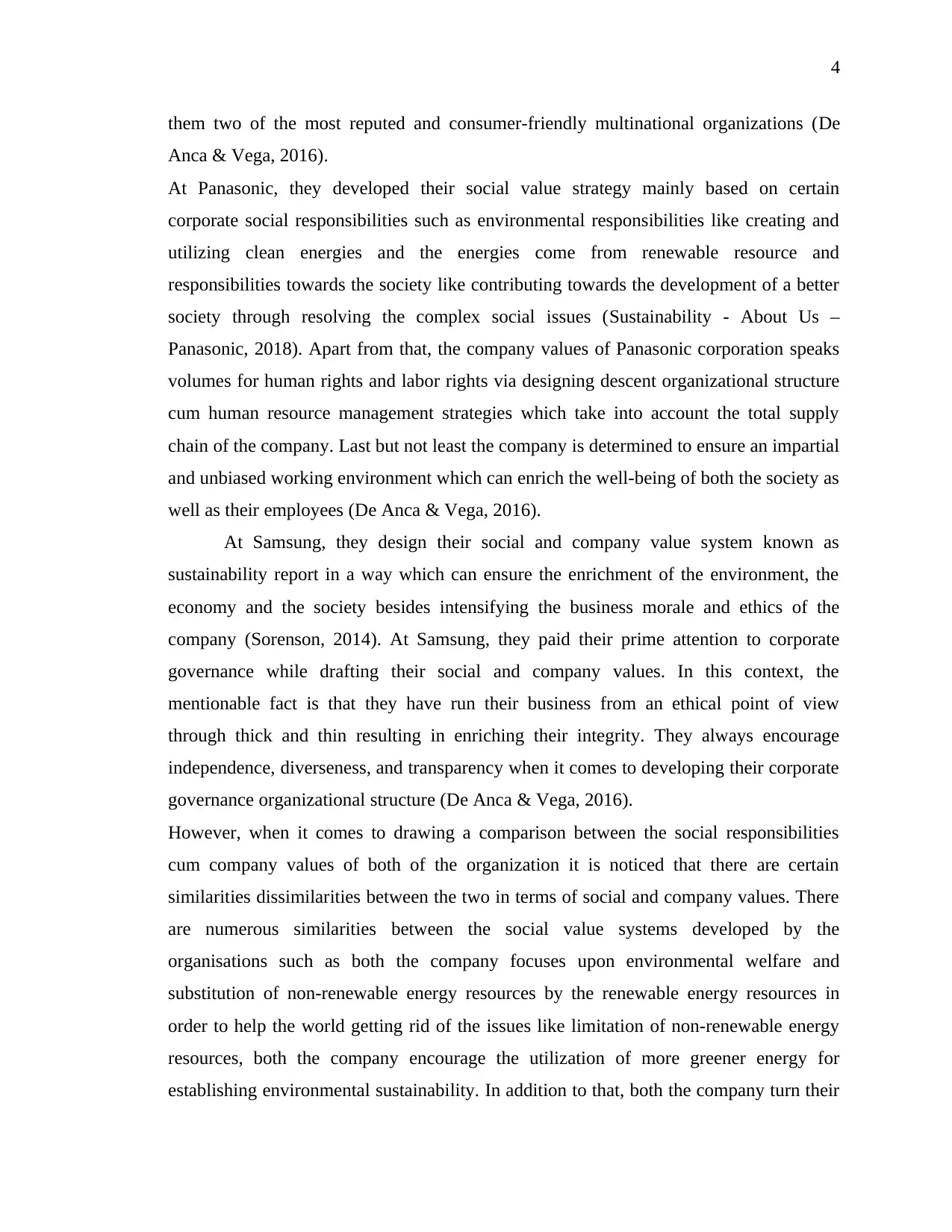
4
them two of the most reputed and consumer-friendly multinational organizations (De
Anca & Vega, 2016).
At Panasonic, they developed their social value strategy mainly based on certain
corporate social responsibilities such as environmental responsibilities like creating and
utilizing clean energies and the energies come from renewable resource and
responsibilities towards the society like contributing towards the development of a better
society through resolving the complex social issues (Sustainability - About Us –
Panasonic, 2018). Apart from that, the company values of Panasonic corporation speaks
volumes for human rights and labor rights via designing descent organizational structure
cum human resource management strategies which take into account the total supply
chain of the company. Last but not least the company is determined to ensure an impartial
and unbiased working environment which can enrich the well-being of both the society as
well as their employees (De Anca & Vega, 2016).
At Samsung, they design their social and company value system known as
sustainability report in a way which can ensure the enrichment of the environment, the
economy and the society besides intensifying the business morale and ethics of the
company (Sorenson, 2014). At Samsung, they paid their prime attention to corporate
governance while drafting their social and company values. In this context, the
mentionable fact is that they have run their business from an ethical point of view
through thick and thin resulting in enriching their integrity. They always encourage
independence, diverseness, and transparency when it comes to developing their corporate
governance organizational structure (De Anca & Vega, 2016).
However, when it comes to drawing a comparison between the social responsibilities
cum company values of both of the organization it is noticed that there are certain
similarities dissimilarities between the two in terms of social and company values. There
are numerous similarities between the social value systems developed by the
organisations such as both the company focuses upon environmental welfare and
substitution of non-renewable energy resources by the renewable energy resources in
order to help the world getting rid of the issues like limitation of non-renewable energy
resources, both the company encourage the utilization of more greener energy for
establishing environmental sustainability. In addition to that, both the company turn their
them two of the most reputed and consumer-friendly multinational organizations (De
Anca & Vega, 2016).
At Panasonic, they developed their social value strategy mainly based on certain
corporate social responsibilities such as environmental responsibilities like creating and
utilizing clean energies and the energies come from renewable resource and
responsibilities towards the society like contributing towards the development of a better
society through resolving the complex social issues (Sustainability - About Us –
Panasonic, 2018). Apart from that, the company values of Panasonic corporation speaks
volumes for human rights and labor rights via designing descent organizational structure
cum human resource management strategies which take into account the total supply
chain of the company. Last but not least the company is determined to ensure an impartial
and unbiased working environment which can enrich the well-being of both the society as
well as their employees (De Anca & Vega, 2016).
At Samsung, they design their social and company value system known as
sustainability report in a way which can ensure the enrichment of the environment, the
economy and the society besides intensifying the business morale and ethics of the
company (Sorenson, 2014). At Samsung, they paid their prime attention to corporate
governance while drafting their social and company values. In this context, the
mentionable fact is that they have run their business from an ethical point of view
through thick and thin resulting in enriching their integrity. They always encourage
independence, diverseness, and transparency when it comes to developing their corporate
governance organizational structure (De Anca & Vega, 2016).
However, when it comes to drawing a comparison between the social responsibilities
cum company values of both of the organization it is noticed that there are certain
similarities dissimilarities between the two in terms of social and company values. There
are numerous similarities between the social value systems developed by the
organisations such as both the company focuses upon environmental welfare and
substitution of non-renewable energy resources by the renewable energy resources in
order to help the world getting rid of the issues like limitation of non-renewable energy
resources, both the company encourage the utilization of more greener energy for
establishing environmental sustainability. In addition to that, both the company turn their
Paraphrase This Document
Need a fresh take? Get an instant paraphrase of this document with our AI Paraphraser
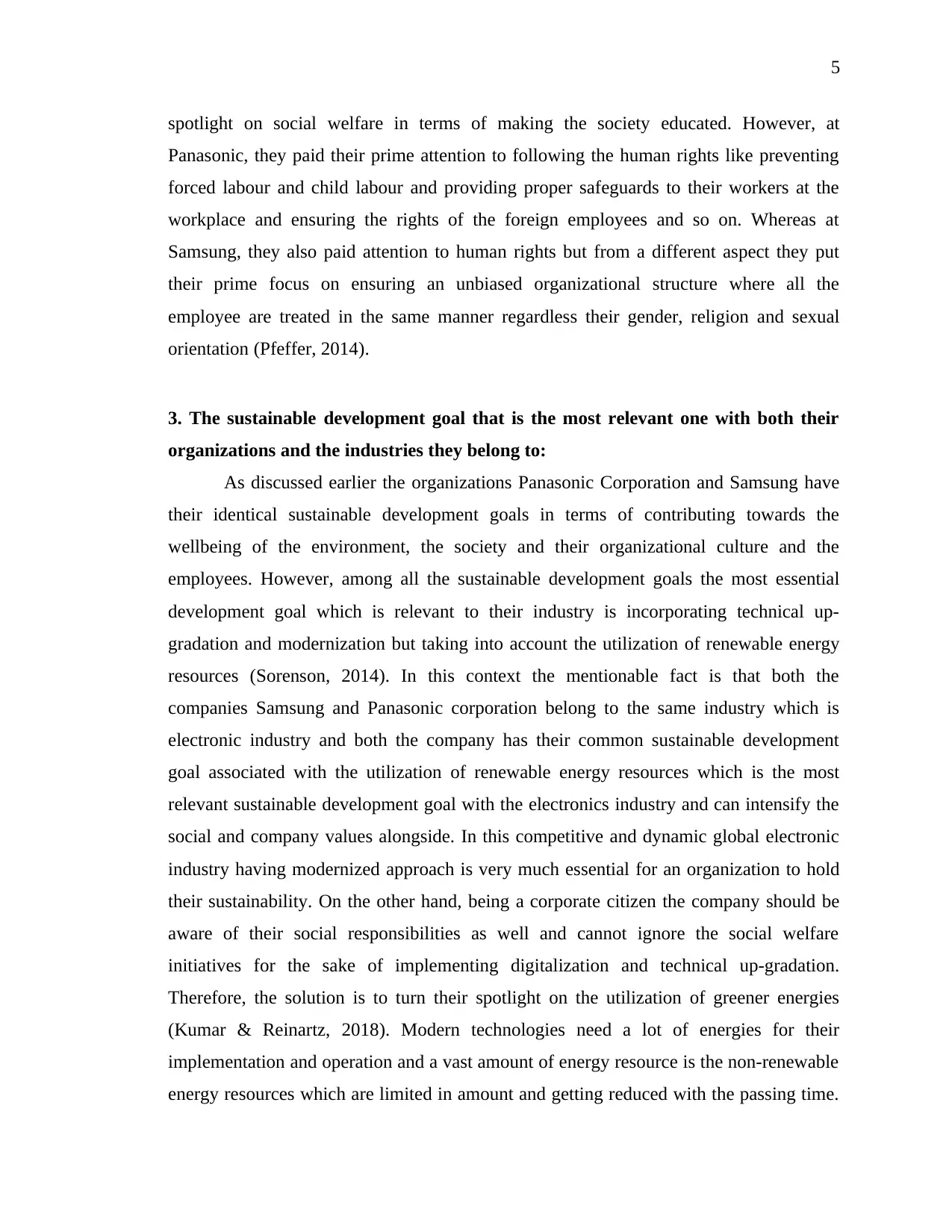
5
spotlight on social welfare in terms of making the society educated. However, at
Panasonic, they paid their prime attention to following the human rights like preventing
forced labour and child labour and providing proper safeguards to their workers at the
workplace and ensuring the rights of the foreign employees and so on. Whereas at
Samsung, they also paid attention to human rights but from a different aspect they put
their prime focus on ensuring an unbiased organizational structure where all the
employee are treated in the same manner regardless their gender, religion and sexual
orientation (Pfeffer, 2014).
3. The sustainable development goal that is the most relevant one with both their
organizations and the industries they belong to:
As discussed earlier the organizations Panasonic Corporation and Samsung have
their identical sustainable development goals in terms of contributing towards the
wellbeing of the environment, the society and their organizational culture and the
employees. However, among all the sustainable development goals the most essential
development goal which is relevant to their industry is incorporating technical up-
gradation and modernization but taking into account the utilization of renewable energy
resources (Sorenson, 2014). In this context the mentionable fact is that both the
companies Samsung and Panasonic corporation belong to the same industry which is
electronic industry and both the company has their common sustainable development
goal associated with the utilization of renewable energy resources which is the most
relevant sustainable development goal with the electronics industry and can intensify the
social and company values alongside. In this competitive and dynamic global electronic
industry having modernized approach is very much essential for an organization to hold
their sustainability. On the other hand, being a corporate citizen the company should be
aware of their social responsibilities as well and cannot ignore the social welfare
initiatives for the sake of implementing digitalization and technical up-gradation.
Therefore, the solution is to turn their spotlight on the utilization of greener energies
(Kumar & Reinartz, 2018). Modern technologies need a lot of energies for their
implementation and operation and a vast amount of energy resource is the non-renewable
energy resources which are limited in amount and getting reduced with the passing time.
spotlight on social welfare in terms of making the society educated. However, at
Panasonic, they paid their prime attention to following the human rights like preventing
forced labour and child labour and providing proper safeguards to their workers at the
workplace and ensuring the rights of the foreign employees and so on. Whereas at
Samsung, they also paid attention to human rights but from a different aspect they put
their prime focus on ensuring an unbiased organizational structure where all the
employee are treated in the same manner regardless their gender, religion and sexual
orientation (Pfeffer, 2014).
3. The sustainable development goal that is the most relevant one with both their
organizations and the industries they belong to:
As discussed earlier the organizations Panasonic Corporation and Samsung have
their identical sustainable development goals in terms of contributing towards the
wellbeing of the environment, the society and their organizational culture and the
employees. However, among all the sustainable development goals the most essential
development goal which is relevant to their industry is incorporating technical up-
gradation and modernization but taking into account the utilization of renewable energy
resources (Sorenson, 2014). In this context the mentionable fact is that both the
companies Samsung and Panasonic corporation belong to the same industry which is
electronic industry and both the company has their common sustainable development
goal associated with the utilization of renewable energy resources which is the most
relevant sustainable development goal with the electronics industry and can intensify the
social and company values alongside. In this competitive and dynamic global electronic
industry having modernized approach is very much essential for an organization to hold
their sustainability. On the other hand, being a corporate citizen the company should be
aware of their social responsibilities as well and cannot ignore the social welfare
initiatives for the sake of implementing digitalization and technical up-gradation.
Therefore, the solution is to turn their spotlight on the utilization of greener energies
(Kumar & Reinartz, 2018). Modern technologies need a lot of energies for their
implementation and operation and a vast amount of energy resource is the non-renewable
energy resources which are limited in amount and getting reduced with the passing time.
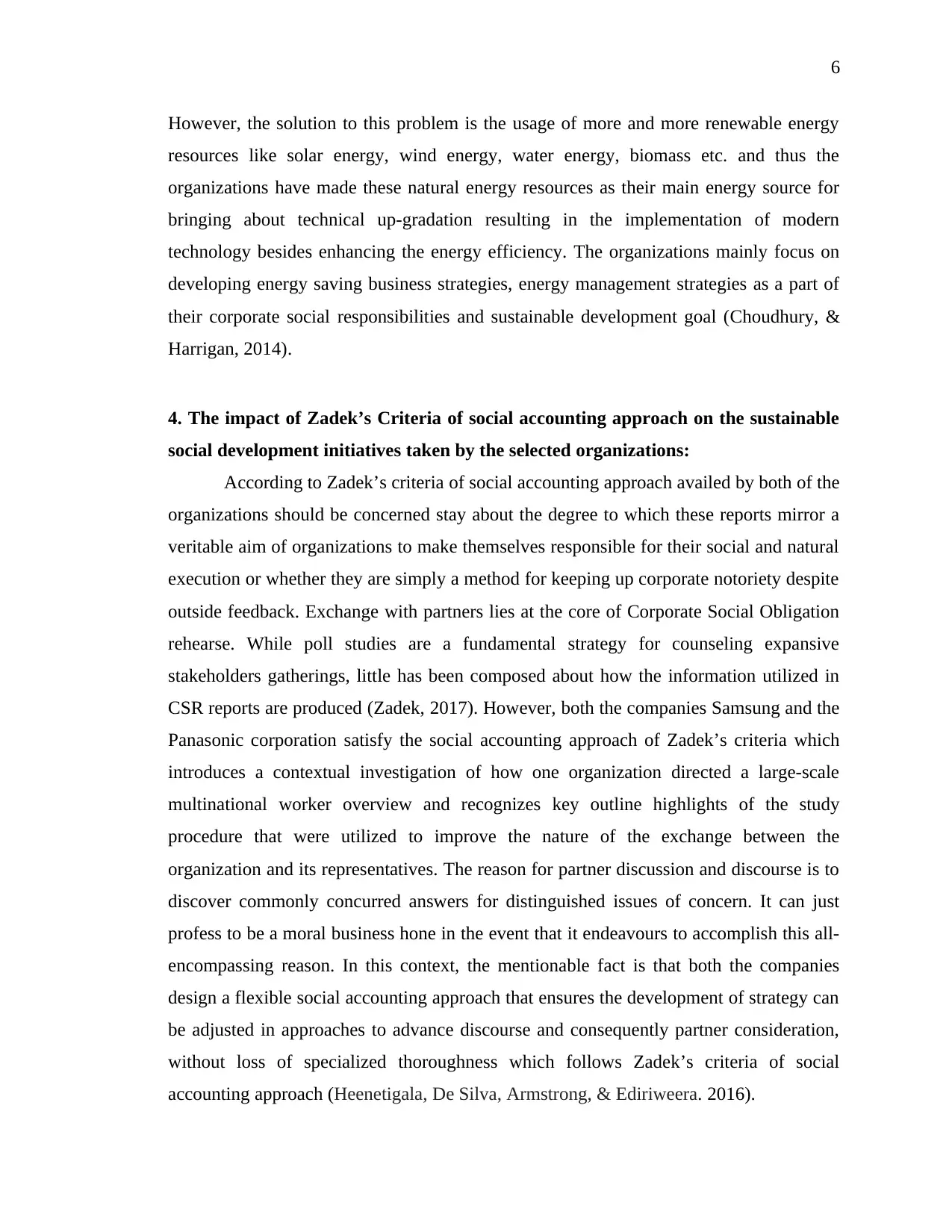
6
However, the solution to this problem is the usage of more and more renewable energy
resources like solar energy, wind energy, water energy, biomass etc. and thus the
organizations have made these natural energy resources as their main energy source for
bringing about technical up-gradation resulting in the implementation of modern
technology besides enhancing the energy efficiency. The organizations mainly focus on
developing energy saving business strategies, energy management strategies as a part of
their corporate social responsibilities and sustainable development goal (Choudhury, &
Harrigan, 2014).
4. The impact of Zadek’s Criteria of social accounting approach on the sustainable
social development initiatives taken by the selected organizations:
According to Zadek’s criteria of social accounting approach availed by both of the
organizations should be concerned stay about the degree to which these reports mirror a
veritable aim of organizations to make themselves responsible for their social and natural
execution or whether they are simply a method for keeping up corporate notoriety despite
outside feedback. Exchange with partners lies at the core of Corporate Social Obligation
rehearse. While poll studies are a fundamental strategy for counseling expansive
stakeholders gatherings, little has been composed about how the information utilized in
CSR reports are produced (Zadek, 2017). However, both the companies Samsung and the
Panasonic corporation satisfy the social accounting approach of Zadek’s criteria which
introduces a contextual investigation of how one organization directed a large-scale
multinational worker overview and recognizes key outline highlights of the study
procedure that were utilized to improve the nature of the exchange between the
organization and its representatives. The reason for partner discussion and discourse is to
discover commonly concurred answers for distinguished issues of concern. It can just
profess to be a moral business hone in the event that it endeavours to accomplish this all-
encompassing reason. In this context, the mentionable fact is that both the companies
design a flexible social accounting approach that ensures the development of strategy can
be adjusted in approaches to advance discourse and consequently partner consideration,
without loss of specialized thoroughness which follows Zadek’s criteria of social
accounting approach (Heenetigala, De Silva, Armstrong, & Ediriweera. 2016).
However, the solution to this problem is the usage of more and more renewable energy
resources like solar energy, wind energy, water energy, biomass etc. and thus the
organizations have made these natural energy resources as their main energy source for
bringing about technical up-gradation resulting in the implementation of modern
technology besides enhancing the energy efficiency. The organizations mainly focus on
developing energy saving business strategies, energy management strategies as a part of
their corporate social responsibilities and sustainable development goal (Choudhury, &
Harrigan, 2014).
4. The impact of Zadek’s Criteria of social accounting approach on the sustainable
social development initiatives taken by the selected organizations:
According to Zadek’s criteria of social accounting approach availed by both of the
organizations should be concerned stay about the degree to which these reports mirror a
veritable aim of organizations to make themselves responsible for their social and natural
execution or whether they are simply a method for keeping up corporate notoriety despite
outside feedback. Exchange with partners lies at the core of Corporate Social Obligation
rehearse. While poll studies are a fundamental strategy for counseling expansive
stakeholders gatherings, little has been composed about how the information utilized in
CSR reports are produced (Zadek, 2017). However, both the companies Samsung and the
Panasonic corporation satisfy the social accounting approach of Zadek’s criteria which
introduces a contextual investigation of how one organization directed a large-scale
multinational worker overview and recognizes key outline highlights of the study
procedure that were utilized to improve the nature of the exchange between the
organization and its representatives. The reason for partner discussion and discourse is to
discover commonly concurred answers for distinguished issues of concern. It can just
profess to be a moral business hone in the event that it endeavours to accomplish this all-
encompassing reason. In this context, the mentionable fact is that both the companies
design a flexible social accounting approach that ensures the development of strategy can
be adjusted in approaches to advance discourse and consequently partner consideration,
without loss of specialized thoroughness which follows Zadek’s criteria of social
accounting approach (Heenetigala, De Silva, Armstrong, & Ediriweera. 2016).
⊘ This is a preview!⊘
Do you want full access?
Subscribe today to unlock all pages.

Trusted by 1+ million students worldwide
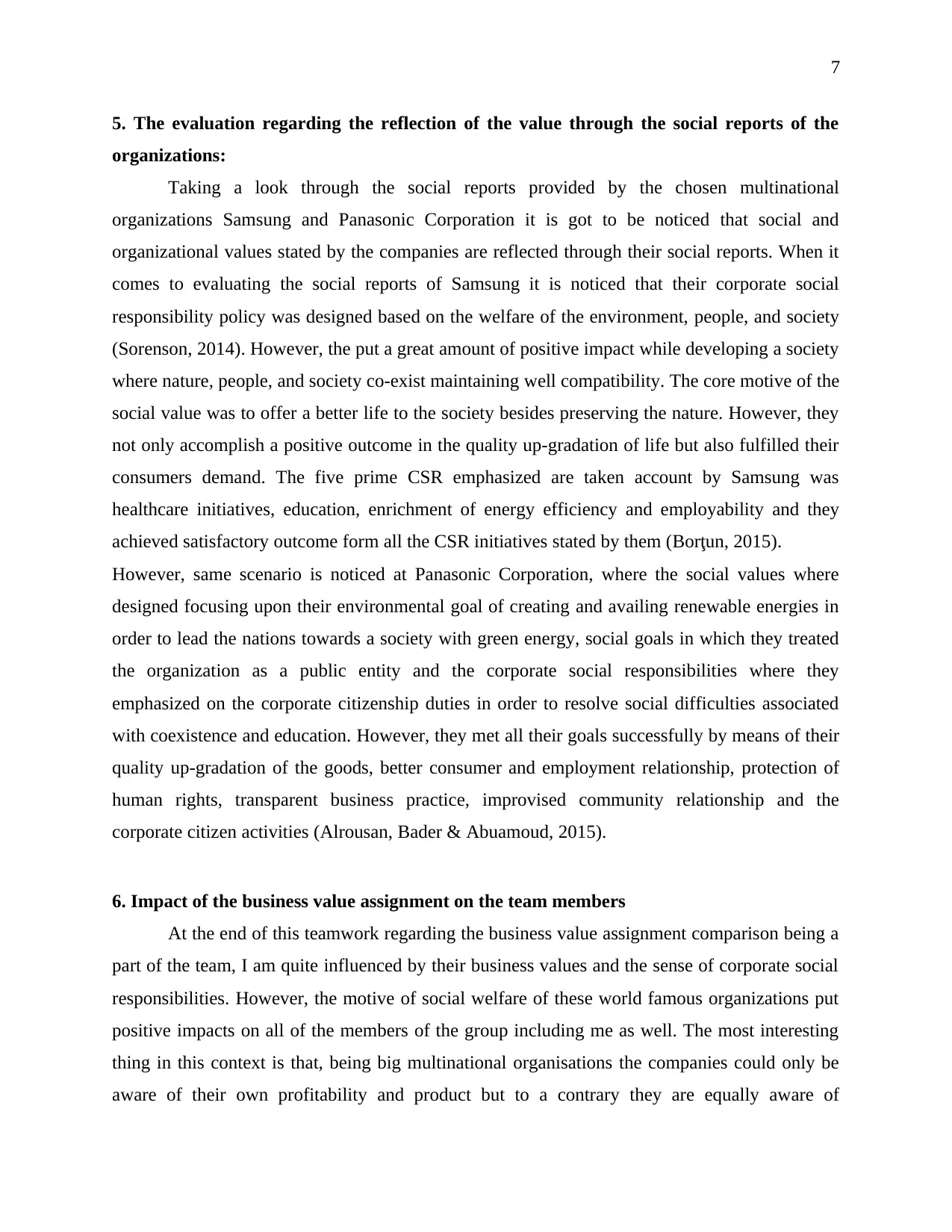
7
5. The evaluation regarding the reflection of the value through the social reports of the
organizations:
Taking a look through the social reports provided by the chosen multinational
organizations Samsung and Panasonic Corporation it is got to be noticed that social and
organizational values stated by the companies are reflected through their social reports. When it
comes to evaluating the social reports of Samsung it is noticed that their corporate social
responsibility policy was designed based on the welfare of the environment, people, and society
(Sorenson, 2014). However, the put a great amount of positive impact while developing a society
where nature, people, and society co-exist maintaining well compatibility. The core motive of the
social value was to offer a better life to the society besides preserving the nature. However, they
not only accomplish a positive outcome in the quality up-gradation of life but also fulfilled their
consumers demand. The five prime CSR emphasized are taken account by Samsung was
healthcare initiatives, education, enrichment of energy efficiency and employability and they
achieved satisfactory outcome form all the CSR initiatives stated by them (Borţun, 2015).
However, same scenario is noticed at Panasonic Corporation, where the social values where
designed focusing upon their environmental goal of creating and availing renewable energies in
order to lead the nations towards a society with green energy, social goals in which they treated
the organization as a public entity and the corporate social responsibilities where they
emphasized on the corporate citizenship duties in order to resolve social difficulties associated
with coexistence and education. However, they met all their goals successfully by means of their
quality up-gradation of the goods, better consumer and employment relationship, protection of
human rights, transparent business practice, improvised community relationship and the
corporate citizen activities (Alrousan, Bader & Abuamoud, 2015).
6. Impact of the business value assignment on the team members
At the end of this teamwork regarding the business value assignment comparison being a
part of the team, I am quite influenced by their business values and the sense of corporate social
responsibilities. However, the motive of social welfare of these world famous organizations put
positive impacts on all of the members of the group including me as well. The most interesting
thing in this context is that, being big multinational organisations the companies could only be
aware of their own profitability and product but to a contrary they are equally aware of
5. The evaluation regarding the reflection of the value through the social reports of the
organizations:
Taking a look through the social reports provided by the chosen multinational
organizations Samsung and Panasonic Corporation it is got to be noticed that social and
organizational values stated by the companies are reflected through their social reports. When it
comes to evaluating the social reports of Samsung it is noticed that their corporate social
responsibility policy was designed based on the welfare of the environment, people, and society
(Sorenson, 2014). However, the put a great amount of positive impact while developing a society
where nature, people, and society co-exist maintaining well compatibility. The core motive of the
social value was to offer a better life to the society besides preserving the nature. However, they
not only accomplish a positive outcome in the quality up-gradation of life but also fulfilled their
consumers demand. The five prime CSR emphasized are taken account by Samsung was
healthcare initiatives, education, enrichment of energy efficiency and employability and they
achieved satisfactory outcome form all the CSR initiatives stated by them (Borţun, 2015).
However, same scenario is noticed at Panasonic Corporation, where the social values where
designed focusing upon their environmental goal of creating and availing renewable energies in
order to lead the nations towards a society with green energy, social goals in which they treated
the organization as a public entity and the corporate social responsibilities where they
emphasized on the corporate citizenship duties in order to resolve social difficulties associated
with coexistence and education. However, they met all their goals successfully by means of their
quality up-gradation of the goods, better consumer and employment relationship, protection of
human rights, transparent business practice, improvised community relationship and the
corporate citizen activities (Alrousan, Bader & Abuamoud, 2015).
6. Impact of the business value assignment on the team members
At the end of this teamwork regarding the business value assignment comparison being a
part of the team, I am quite influenced by their business values and the sense of corporate social
responsibilities. However, the motive of social welfare of these world famous organizations put
positive impacts on all of the members of the group including me as well. The most interesting
thing in this context is that, being big multinational organisations the companies could only be
aware of their own profitability and product but to a contrary they are equally aware of
Paraphrase This Document
Need a fresh take? Get an instant paraphrase of this document with our AI Paraphraser
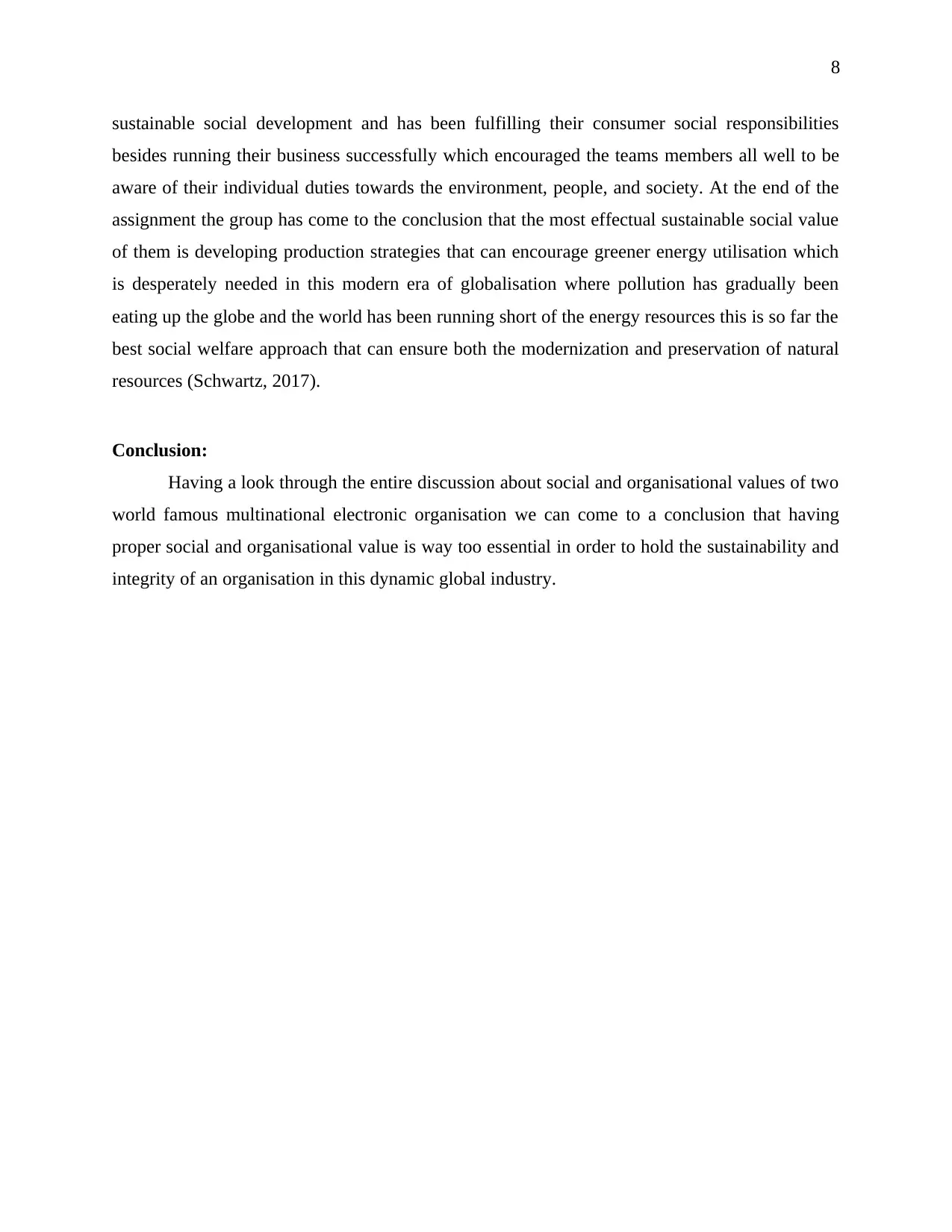
8
sustainable social development and has been fulfilling their consumer social responsibilities
besides running their business successfully which encouraged the teams members all well to be
aware of their individual duties towards the environment, people, and society. At the end of the
assignment the group has come to the conclusion that the most effectual sustainable social value
of them is developing production strategies that can encourage greener energy utilisation which
is desperately needed in this modern era of globalisation where pollution has gradually been
eating up the globe and the world has been running short of the energy resources this is so far the
best social welfare approach that can ensure both the modernization and preservation of natural
resources (Schwartz, 2017).
Conclusion:
Having a look through the entire discussion about social and organisational values of two
world famous multinational electronic organisation we can come to a conclusion that having
proper social and organisational value is way too essential in order to hold the sustainability and
integrity of an organisation in this dynamic global industry.
sustainable social development and has been fulfilling their consumer social responsibilities
besides running their business successfully which encouraged the teams members all well to be
aware of their individual duties towards the environment, people, and society. At the end of the
assignment the group has come to the conclusion that the most effectual sustainable social value
of them is developing production strategies that can encourage greener energy utilisation which
is desperately needed in this modern era of globalisation where pollution has gradually been
eating up the globe and the world has been running short of the energy resources this is so far the
best social welfare approach that can ensure both the modernization and preservation of natural
resources (Schwartz, 2017).
Conclusion:
Having a look through the entire discussion about social and organisational values of two
world famous multinational electronic organisation we can come to a conclusion that having
proper social and organisational value is way too essential in order to hold the sustainability and
integrity of an organisation in this dynamic global industry.
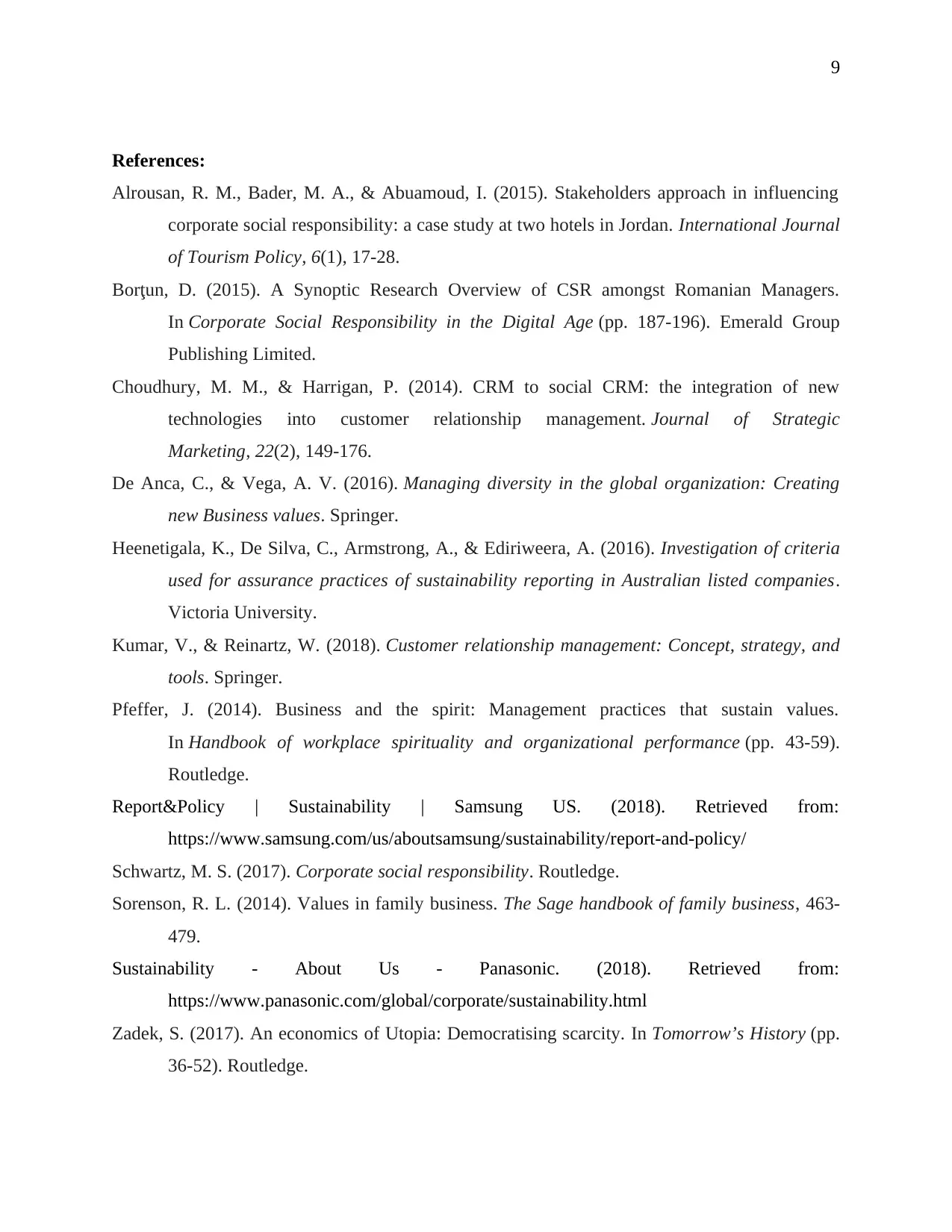
9
References:
Alrousan, R. M., Bader, M. A., & Abuamoud, I. (2015). Stakeholders approach in influencing
corporate social responsibility: a case study at two hotels in Jordan. International Journal
of Tourism Policy, 6(1), 17-28.
Borţun, D. (2015). A Synoptic Research Overview of CSR amongst Romanian Managers.
In Corporate Social Responsibility in the Digital Age (pp. 187-196). Emerald Group
Publishing Limited.
Choudhury, M. M., & Harrigan, P. (2014). CRM to social CRM: the integration of new
technologies into customer relationship management. Journal of Strategic
Marketing, 22(2), 149-176.
De Anca, C., & Vega, A. V. (2016). Managing diversity in the global organization: Creating
new Business values. Springer.
Heenetigala, K., De Silva, C., Armstrong, A., & Ediriweera, A. (2016). Investigation of criteria
used for assurance practices of sustainability reporting in Australian listed companies.
Victoria University.
Kumar, V., & Reinartz, W. (2018). Customer relationship management: Concept, strategy, and
tools. Springer.
Pfeffer, J. (2014). Business and the spirit: Management practices that sustain values.
In Handbook of workplace spirituality and organizational performance (pp. 43-59).
Routledge.
Report&Policy | Sustainability | Samsung US. (2018). Retrieved from:
https://www.samsung.com/us/aboutsamsung/sustainability/report-and-policy/
Schwartz, M. S. (2017). Corporate social responsibility. Routledge.
Sorenson, R. L. (2014). Values in family business. The Sage handbook of family business, 463-
479.
Sustainability - About Us - Panasonic. (2018). Retrieved from:
https://www.panasonic.com/global/corporate/sustainability.html
Zadek, S. (2017). An economics of Utopia: Democratising scarcity. In Tomorrow’s History (pp.
36-52). Routledge.
References:
Alrousan, R. M., Bader, M. A., & Abuamoud, I. (2015). Stakeholders approach in influencing
corporate social responsibility: a case study at two hotels in Jordan. International Journal
of Tourism Policy, 6(1), 17-28.
Borţun, D. (2015). A Synoptic Research Overview of CSR amongst Romanian Managers.
In Corporate Social Responsibility in the Digital Age (pp. 187-196). Emerald Group
Publishing Limited.
Choudhury, M. M., & Harrigan, P. (2014). CRM to social CRM: the integration of new
technologies into customer relationship management. Journal of Strategic
Marketing, 22(2), 149-176.
De Anca, C., & Vega, A. V. (2016). Managing diversity in the global organization: Creating
new Business values. Springer.
Heenetigala, K., De Silva, C., Armstrong, A., & Ediriweera, A. (2016). Investigation of criteria
used for assurance practices of sustainability reporting in Australian listed companies.
Victoria University.
Kumar, V., & Reinartz, W. (2018). Customer relationship management: Concept, strategy, and
tools. Springer.
Pfeffer, J. (2014). Business and the spirit: Management practices that sustain values.
In Handbook of workplace spirituality and organizational performance (pp. 43-59).
Routledge.
Report&Policy | Sustainability | Samsung US. (2018). Retrieved from:
https://www.samsung.com/us/aboutsamsung/sustainability/report-and-policy/
Schwartz, M. S. (2017). Corporate social responsibility. Routledge.
Sorenson, R. L. (2014). Values in family business. The Sage handbook of family business, 463-
479.
Sustainability - About Us - Panasonic. (2018). Retrieved from:
https://www.panasonic.com/global/corporate/sustainability.html
Zadek, S. (2017). An economics of Utopia: Democratising scarcity. In Tomorrow’s History (pp.
36-52). Routledge.
⊘ This is a preview!⊘
Do you want full access?
Subscribe today to unlock all pages.

Trusted by 1+ million students worldwide

10
1 out of 10
Related Documents
Your All-in-One AI-Powered Toolkit for Academic Success.
+13062052269
info@desklib.com
Available 24*7 on WhatsApp / Email
![[object Object]](/_next/static/media/star-bottom.7253800d.svg)
Unlock your academic potential
Copyright © 2020–2026 A2Z Services. All Rights Reserved. Developed and managed by ZUCOL.




